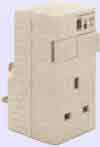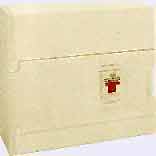An important development in home safety, RCDs (Residual Current Devices) are simple fittings designed to help prevent electric shock and other accidents due to faulty electrical appliances or wiring. They are now available from many leading electrical manufacturers.
An RCD can detect changes in the proper flow of electric current (when a flex or cable is cut, for instance, or an electrical tool malfunctions). Within milliseconds of this happening, the RCD automatically disconnects the power supply to the equipment before you can be electrocuted or further damage can be done.
RCD protection is advisable with any portable mains appliance being used in a garden, or garage, or kitchen. This means electrical garden equipment like hedge cutters, lawnmowers, trimmers, chainsaws etc., and tools like drills, sanders, etc., where it is all too easy to slice through a cable accidentally.
The moisture in places such as kitchens is an additional hazard, greatly increasing the risk of electrocution.
Yes, four.
Plug into any 13-amp, 3-pin socket and then any appliance plugs into them. Portable; can be moved from socket to socket as needed, but must be remembered each time any appliance is used.

Socket RCDs
Permanently installed, wall-mounted sockets instead of ‘normal’ ones. Excellent protection for every appliance plugged in there, but how many socket positions do you need to cope with all appliances used around your home?

Whole Home RCD protection
RCDs are installed close to your meter, to protect selected appliances throughout your home.

No.4 - Whole Home RCD protection. It replaces the need for individual plug RCDs, adaptor RCDs or socket RCDs, and offers maximum protection.
The minor disadvantage of ‘nuisance tripping’ (where activating the RCD could shut down the electricity all through your home) can now be reduced by having only selected circuits connected. This separates certain circuits so that lighting, for instance, and freezers remain unaffected and continue to function uninterrupted.
Type 1 (plugs) and type 2 (adaptors) do not need special fitting.
Type 3 (sockets) and type 4 (Whole Home) do, and must be installed by a professional electrician.
See the range of RCD fittings at your electricity company showroom and other local suppliers. Ask at those same places for details of Whole Home installation, or contact professional electricians. When comparing the prices of one type of RCD against another type, remember to calculate carefully how many of each sort you would need for proper safety on all your relevant appliances. Whole Home installation sometimes seems expensive at first, but it is a one-off cost that will protect your whole home for years to come.
To be effective, RCDs must be tested frequently every 2 or 3 months as mentioned on the maker’s instructions.
Any electrical appliance must always be handled with great care. Please read the following notes.
RCDs are a vital safety precaution, but they cannot guarantee 100% protection. Even with them in your home, it is essential to treat electricity with care!
Check plugs regularly to see they are undamaged and firmly wired.
Never overload a socket by plugging in too many appliances or adaptors.
Keep water away from anything electric. In particular, do not wash walls without turning off the power at the mains switch. Never use a socket or plug or a piece of electrical equipment that could still have water in it. However long you have to wait, let it dry thoroughly before you switch it on again.
Never use mains electrical appliances like radios, TVs, hairdryers, portable heaters etc. in a bathroom, where water and steam make them very dangerous. If you need more heat in your bathroom, have a fixed wall heater specially fitted.
A plain flex for an electric kettle should never be longer than 80cm (2 feet 6 inches), to lessen the risk of a child pulling on it and upsetting the scalding water. Far safer is a shorter coiled flex.
If you have young children, consider using socket covers.
Do not attempt socket repairs, wiring or re-wiring in your home unless you are already a qualified electrician. Get a professional to do the job safely.
Our forum is the perfect place to ask questions and get help. Join us, post your question/comment now!